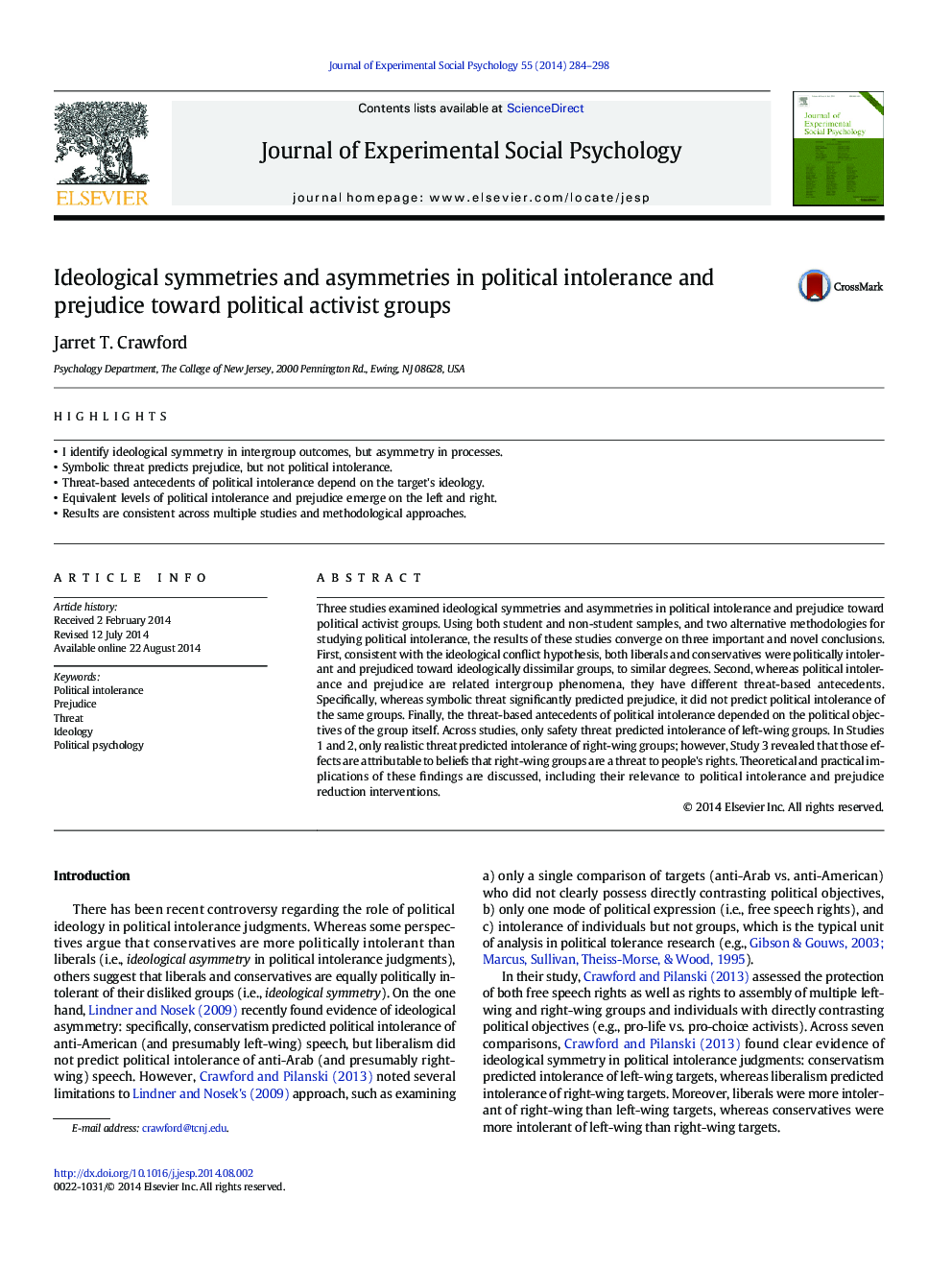| کد مقاله | کد نشریه | سال انتشار | مقاله انگلیسی | نسخه تمام متن |
|---|---|---|---|---|
| 7324813 | 1475868 | 2014 | 15 صفحه PDF | دانلود رایگان |
عنوان انگلیسی مقاله ISI
Ideological symmetries and asymmetries in political intolerance and prejudice toward political activist groups
ترجمه فارسی عنوان
تقارن ایدئولوژیک و عدم تقارن در عدم تحمل سیاسی و تعصب در برابر گروه های فعال سیاسی
دانلود مقاله + سفارش ترجمه
دانلود مقاله ISI انگلیسی
رایگان برای ایرانیان
کلمات کلیدی
عدم تحمل سیاسی، تعصب، تهدید، ایدئولوژی، روانشناسی سیاسی،
ترجمه چکیده
سه مطالعه، همبستگی های ایدئولوژیکی و عدم تقارن در عدم تحمل سیاسی و تعصب در برابر گروه های فعال سیاسی را مورد بررسی قرار داد. با استفاده از نمونه های دانشجویی و غیر دانشجویی و دو روش جایگزین برای مطالعه عدم تحمل سیاسی، نتایج این مطالعات در سه نتیجه مهم و جدید به هم پیوسته است. اولا، مطابق با فرضیه های درگیری های ایدئولوژیک، لیبرال ها و محافظه کاران از لحاظ سیاسی غیر قابل تحمل بودند و به گروه های متفاوت به لحاظ ایدئولوژیک، به درجه مشابهی متوسل شدند. دوم، در حالی که عدم تحمل و تعصب سیاسی مربوط به پدیده بین گروهی است، آنها پیشگام های مبتنی بر تهدید متفاوتی دارند. به طور خاص، در حالی که تهدید نمادین به طور قابل توجهی پیش بینی تعصب، آن را پیش بینی عدم تحمل سیاسی از همان گروه ها بود. سرانجام، پیشینیان مبتنی بر تهدید از عدم تحمل سیاسی، به اهداف سیاسی گروه خود بستگی داشت. در سراسر مطالعات، تنها تهدید ایمنی پیش بینی عدم تحمل گروه های چپ گرا. در مطالعات 1 و 2، تهدید واقعی تنها پیش بینی عدم تحمل گروه های راست دست؛ با این حال، مطالعه 3 نشان داد که این اثرات مربوط به باور هایی است که گروه های راستین تهدیدی برای حقوق مردم می باشند. پیامدهای نظری و عملی این یافتهها شامل ارتباط آنها با عدم تحمل سیاسی و مداخلات کاهش تعصب است.
موضوعات مرتبط
علوم زیستی و بیوفناوری
علم عصب شناسی
علوم اعصاب رفتاری
چکیده انگلیسی
Three studies examined ideological symmetries and asymmetries in political intolerance and prejudice toward political activist groups. Using both student and non-student samples, and two alternative methodologies for studying political intolerance, the results of these studies converge on three important and novel conclusions. First, consistent with the ideological conflict hypothesis, both liberals and conservatives were politically intolerant and prejudiced toward ideologically dissimilar groups, to similar degrees. Second, whereas political intolerance and prejudice are related intergroup phenomena, they have different threat-based antecedents. Specifically, whereas symbolic threat significantly predicted prejudice, it did not predict political intolerance of the same groups. Finally, the threat-based antecedents of political intolerance depended on the political objectives of the group itself. Across studies, only safety threat predicted intolerance of left-wing groups. In Studies 1 and 2, only realistic threat predicted intolerance of right-wing groups; however, Study 3 revealed that those effects are attributable to beliefs that right-wing groups are a threat to people's rights. Theoretical and practical implications of these findings are discussed, including their relevance to political intolerance and prejudice reduction interventions.
ناشر
Database: Elsevier - ScienceDirect (ساینس دایرکت)
Journal: Journal of Experimental Social Psychology - Volume 55, November 2014, Pages 284-298
Journal: Journal of Experimental Social Psychology - Volume 55, November 2014, Pages 284-298
نویسندگان
Jarret T. Crawford,
